Swiss Ball Exercises: 30 Best Stability Ball Workouts
Learn which Swiss ball exercises exclusively tone your lower and upper body, core, and back.
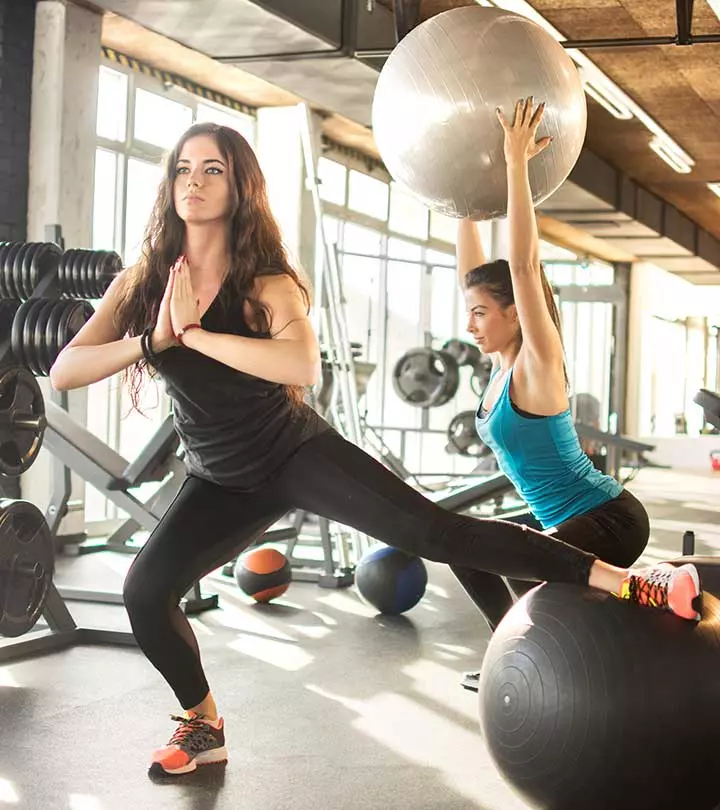
Image: Shutterstock
If you are considering Swiss ball exercises, now is a good time to start. Exercise ball workouts provide many fitness benefits. These bouncy, light balls help improve flexibility, balance, and stability by adding a challenge to your regular exercises.
Ask any fitness coach, and they will tell you that Swiss ball exercises or full body ball exercises offer more advantages over other fitness equipment or bodyweight exercises. But how to add a Swiss ball to your exercise routine and benefit from it? How to do these exercises safely and minimize the risk of injury?
Here, we have included step-by-step directions on doing Swiss ball exercises for the core, upper body, and lower body. We also have discussed the benefits of these exercises. Read on.
 Workout Blueprint: Stability Ball Exercises
Workout Blueprint: Stability Ball Exercises- Frequency: Daily
- Benefits: Improves flexibility, balance, and stability.
- Equipment Needed: Exercise mat, stability ball, dumbbells
- Space Required: Large area
- Assistance Required: Yes, if you are a beginner.
- Who Should Avoid: Anyone with acute low back pain, specific unstable spine injuries, spinal disease, or with muscle, joint, or body injuries.
In This Article
What Is The Swiss Ball And How Does It Work?
The Swiss ball is also known as the exercise ball, gym ball, balance ball, gym ball, or pezzi ball. It is soft and comes in different sizes. It is made of elastic and filled with air. It was developed by Aquilino Cosani, an Italian plastics manufacturer, and was known as the gymnastik.

Initially, it was used for physical rehabilitation, but in the 1980s and 1990s, American therapists started using these balls in the athletic arena. Later, these balls became a key tool in the fitness industry.
The Swiss ball, mainly used for abdominal exercises, works by acting as a surface, weight, and workout machine. The instability of a bouncy round ball works on all the major and minor muscle groups in your body. It also adds resistance to your movement, thereby making you use muscle strength and muscle power to complete the exercise. Beginners interested in medicine ball exercises can first try these as the Swiss ball is much lighter than a medicine ball.
The Swiss ball is used in balance ball exercises, pilates ball exercises, and yoga ball exercises. It works on a deep core muscle, the transverse abdominis. The benefits of adding the Swiss ball to your workout routine are that they aid core stability exercises, help you build a strong core and get flat abs (or belly), improve balance, and reduce back and neck pain (1), (2), (3). A stability ball is a fantastic ab exercise equipment, providing excellent support and versatility to enhance your core workouts. Here are 30 Swiss ball exercises you can try out.
Sobiya, a lawyer and a blogger, shared her weight loss success story in her blog. She explained how she used a yoga mat, a stability ball, a pair of dumbbells, and a jump rope to help her shed those stubborn pounds. She said, “I noticed that I just needed a few things and a strict disciplinary measure, to keep myself motivated and in the loop. By the end of 3 months, I found myself to be 5 kilos lighter (i).”
 Quick Tip
Quick TipKey Takeaways
- Including Swiss ball in your workout regime may help improve your balance, joint movements, flexibility, and muscle endurance.
- It works on deep core muscles and helps reduce neck and back pain.
- You can also use it to increase the difficulty level of your exercises and challenge yourself.
- Swiss ball tricep dip and swiss ball dumbbell chest press aim shoulders, core, and triceps.
- Choose the swiss ball depending on your height.
30 Best Swiss Ball Or Stability Ball Exercises
Always warm-up with stability ball stretches before starting any exercise. Here’s a warm-up routine for you.
Warm-Up
- Head tilts – 1 set of 10 reps
- Neck turns – 1 set of 10 reps
- Arm circles – 1 set of 10 reps
- Wrist circles – 1 set of 10 reps
- Shoulder circles – 1 set of 10 reps
- Waist circles – 1 set of 10 reps
- Side lunges – 1 set of 10 reps
- Calf raises – 2 sets of 10 reps
- Spot jogging – 3 minutes
- Jumping jacks – 2 sets of 20 reps
- Ankle circles- 1 set of 10 reps
- Standing side crunches – 1 set of 10 reps
Let’s begin with the Swiss ball exercises for the upper body.
Upper Body Swiss Ball Exercises
1. Swiss Ball Dumbbell Tricep Extension
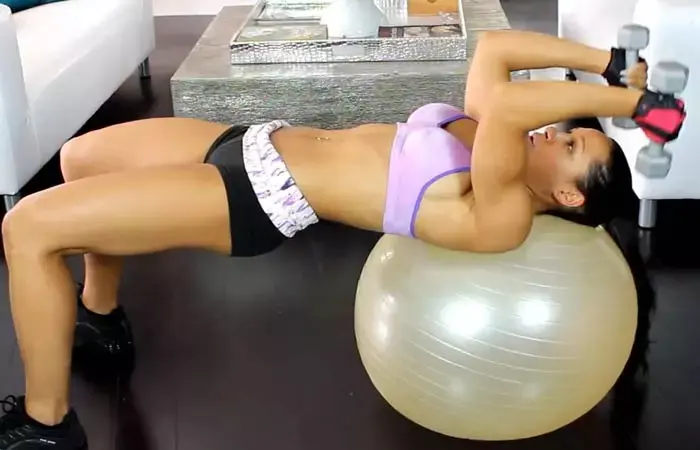
– Triceps, biceps, wrist flexors and extensors, shoulders, core, and glutes.
Steps
- Grab the dumbbells and sit on the stability ball.
- Walk ahead and assume a supine position. Your upper back must rest on the ball, shins should be at right angles with the thighs, and feet flat and shoulder-width apart, in line with your knees. Keep your glutes and core engaged and hips in line with the upper back.
- Lift your hands above your head. Breathe in, flex your elbows, and slowly drop your forearms until the dumbbells are in line with your ears. Make sure your elbows point toward the ceiling when you flex your hands.
- Exhale and push your forearms up and extend your hands back up above your head.
Sets And Reps
– 3 sets of 15 reps
Rest – 90 secs
2. Swiss Ball Tricep Dip
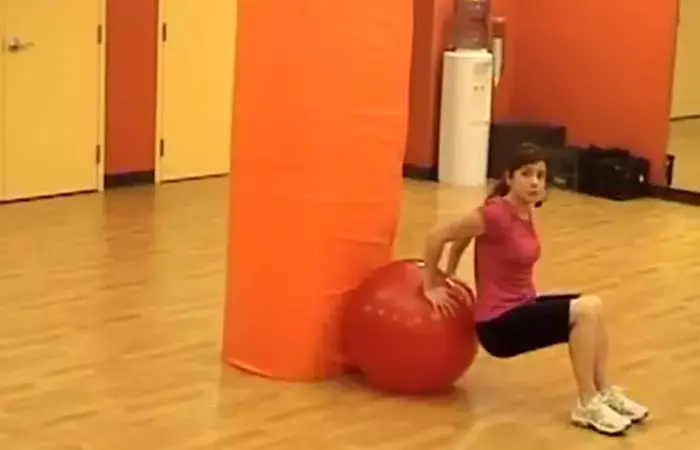
– Triceps, biceps, wrist flexors and extensors, glutes, hamstrings, shoulders, and calves.
Steps
- If you are a beginner, push the ball to a corner and stabilize it.
- Sit on top of the ball and place your hands on it, right beside your buttocks. Walk your feet out and support your body on your heels and palms that are slightly pushing into the stability ball. Your shins should be at about 60 degrees with your thighs.
- Slowly, move your buttocks away from the stability ball and go down until they are about to touch the floor.
- Keeping your core engaged, get back up, and repeat.
Sets And Reps
– 3 sets of 15 reps
Rest – 90 secs
3. Swiss Ball Rear Deltoid Row
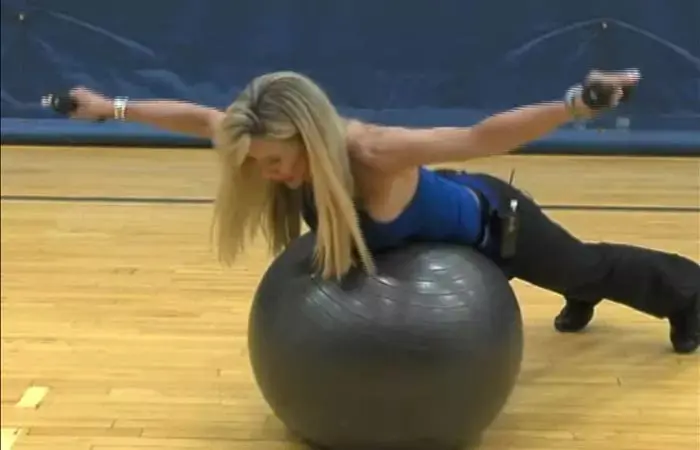
– Back of your shoulders, biceps, wrist flexors and extensors, hamstrings, glutes, and core.
Steps
- Lie on your belly on the Swiss ball. Support your lower body on your toes. Hold a dumbbell in each hand and let the weight of your body fall on the Swiss ball. Keep your neck in line with your spine.
- Extend your arms sideways, bend your elbows a little, and lift your arms until they are in line with your shoulders. Squeeze and contract your shoulder blades.
- Pause for a second and slowly lower your arms.
Sets And Reps
– 2 sets of 15 reps
Rest – 60 secs
4. Swiss Ball Dumbbell Chest Press
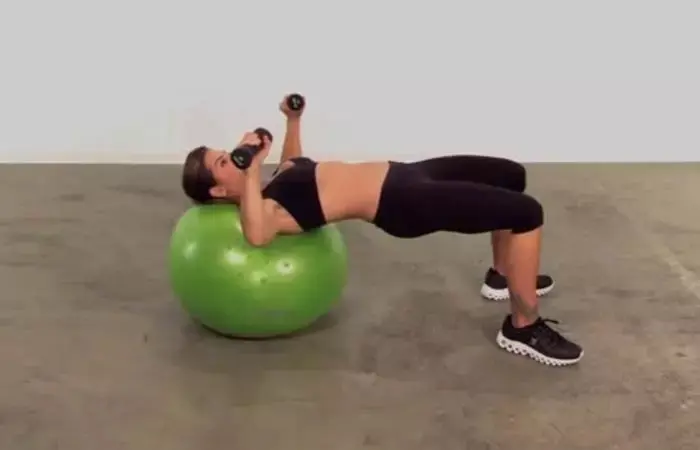
– Chest, shoulders, core, biceps, and triceps.
Steps
- Sit on the Swiss ball and hold a dumbbell in each hand.
- Walk forward and rest the upper side of your back on the Swiss ball. Keep your feet flat on the ground, glutes in line with the thighs and upper body as if you are bridging. Engage your core.
- Hold the dumbbells at the chest level, with your arms at right angles with the forearms and palms facing forward.
- Exhale and press the weight up and extend your hands right above your chest.
- Inhale and lower the dumbbells back to the starting position.
Sets And Reps
– 3 sets of 15 reps
Rest – 20 secs
5. Swiss Ball Dumbbell Shoulder Press
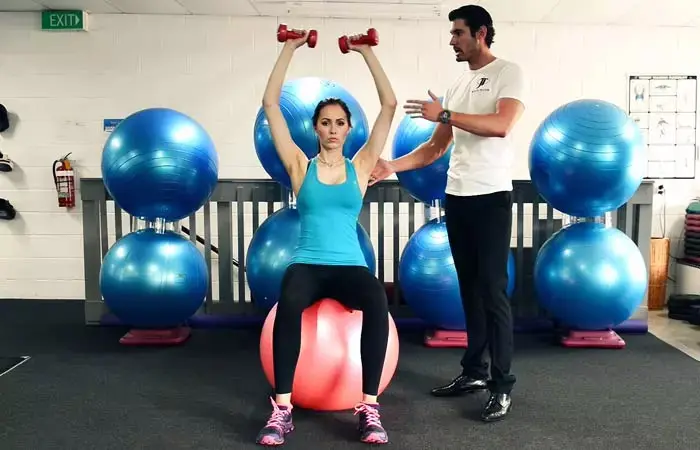
– Shoulders, biceps, triceps, and chest.
Steps
- Sit on the Swiss ball. Keep your feet flat on the ground and hold a dumbbell in each hand right near the edge of your shoulders. Keep your palms facing forward, elbows in line with the chest, and core engaged.
- Exhale and lift the dumbbells as you extend your arms above your head. Let the two dumbbells touch.
- Inhale and bring the arms back down to the starting position.
Sets And Reps
– 3 sets of 15 reps
Rest – 20 secs
6. Swiss Ball Decline Push-Up
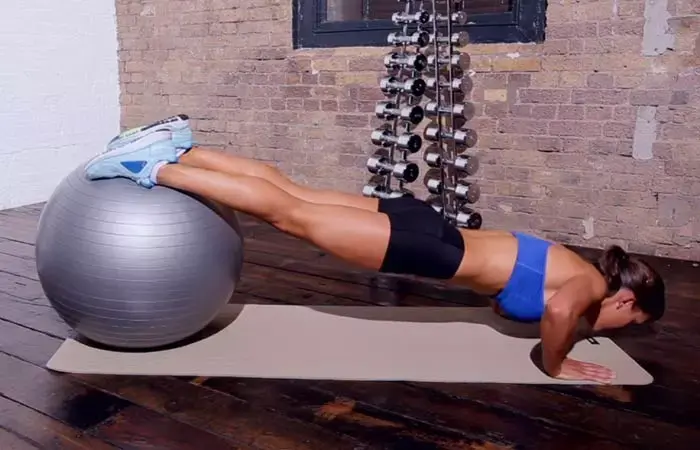
– Biceps, triceps, chest, upper back, shoulders, wrist flexors and extensors, and core.
Steps
- For ball push-ups, roll up on a Swiss ball, walk on your hands, and roll ahead until your knees and shins are resting on the Swiss ball, and the rest of the body is supported on your palms.
- Keeping your core engaged and palms facing forward, push your body down by flexing your elbows until your chin is about to touch the ground.
- Come back up.
Sets And Reps
– 3 sets of 5 reps
Rest – 60 secs
Tip: Increase the reps as you progress and become more comfortable with this exercise.
7. Swiss Ball Incline Push-Up
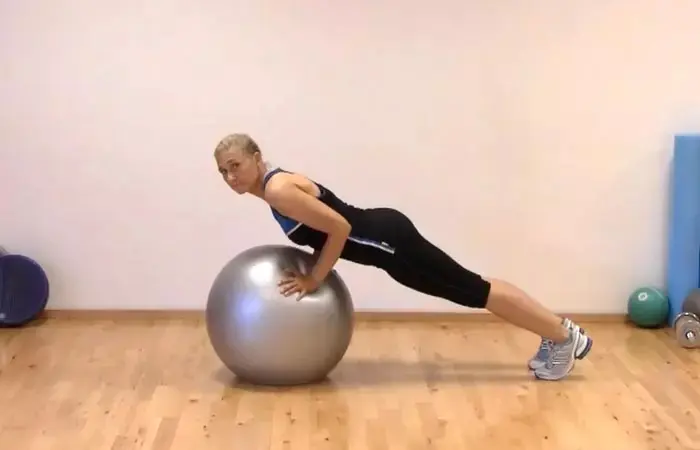
– Biceps, triceps, chest, upper back, shoulders, wrist flexors and extensors, and core.
Steps
- Hold a Swiss ball and place it on the floor.
- Stabilize your body by placing the palms on the ball, slightly pointing outward, and extend your legs behind. Your body should be at 60 degrees with the floor. Keep your core engaged, arms extended, and toes flexed.
- Look at the floor and push down by flexing your elbows until your chest almost touches the ball.
- Push back up to the starting position.
Sets And Reps
– 3 sets of 5 reps
Rest – 50 secs
Tip: Increase the reps as you progress and become more comfortable with this exercise.
8. Swiss Ball Lat Pull
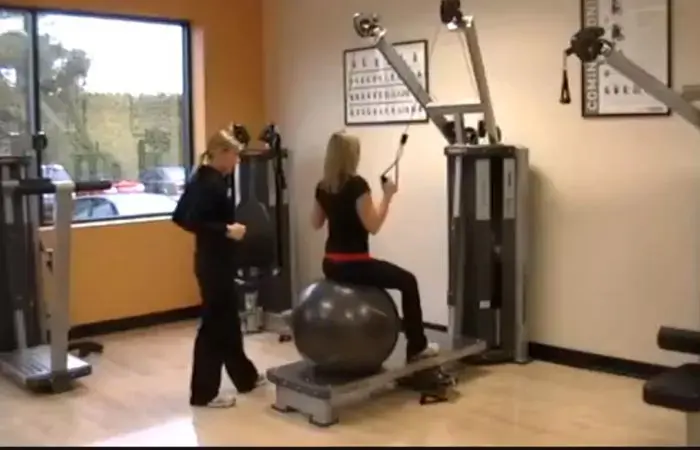
– Lats, shoulders, biceps, triceps, and chest.
Steps
- For this exercise, you need to keep your Swiss ball on the edge of a pull lift machine.
- Stand on the platform and grab hold of the pull handles. Sit down on the Swiss ball. Keep your feet wide apart to stabilize your body. Your palms must face each other.
- Sitting straight and keeping the core engaged, pull down the handles until your elbows shoot past your chest and move toward your back.
- Extend your arms slowly and go back up again to the starting position.
Sets And Reps
– 3 sets of 15 reps
Rest – 50 secs
9. Swiss Ball Dumbbell Chest Fly
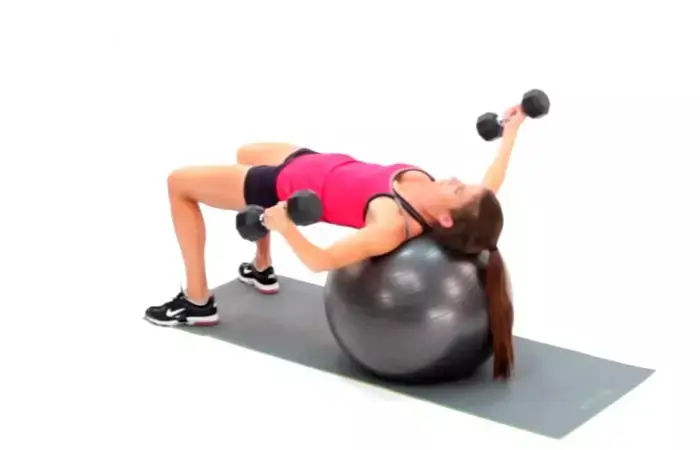
– Chest, shoulders, biceps, triceps, and upper back.
Steps
- Hold a dumbbell in each hand and sit on the Swiss ball. Place your feet flat on the ground.
- Flex your elbows and bring the dumbbells at the same level as your chest. Hold them as if you are going to do hammer curls.
- Walk out toward the front until your upper back is resting on the Swiss ball. Your feet must be flat on the ground, and buttocks lifted and in line with the rest of your body.
- Push your arms up, extend them fully above your chest, and keep your neck in line with your spine. This is the starting position.
- Bring the dumbbells down from above your chest to above the sides of your chest. Your arms should be at 60 degrees with your forearm.
- Push your arms back up to the starting position.
Sets And Reps
– 3 sets of 5 reps
Rest – 50 secs
Tip: Increase the reps as you progress and become more comfortable with this exercise.
These were the exercises for the upper body. Now, let’s move on to the core.
Swiss Ball Exercises For The Core
10. Swiss Ball Crunches
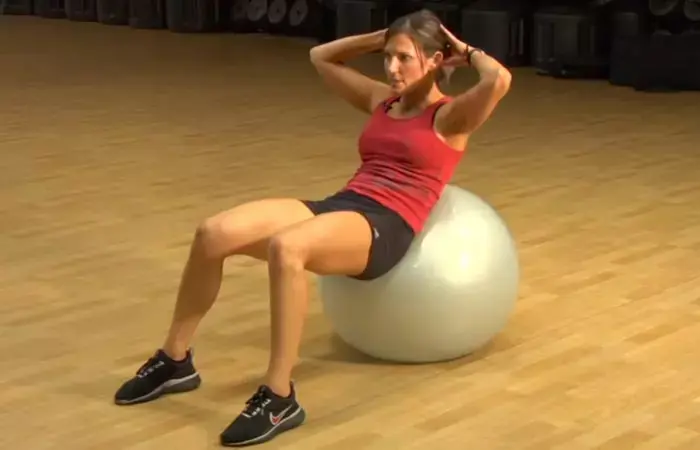
– upper abs, lower abs, middle abs, obliques, lats, and shoulders.
Steps
- For ball crunches, sit on a Swiss ball with your feet flat on the ground.
- Roll down by walking forward and rest your back on the Swiss ball. Support your head and neck by placing the fingertips on the sides of your head. Make sure you are pushing your back into the ball and keep your neck in line with the spine.
- Lift your upper body and crunch.
- Go back down to the starting position and repeat.
Sets And Reps
– 3 sets of 10 reps
Rest – 30 secs
11. Swiss Ball Russian Twist
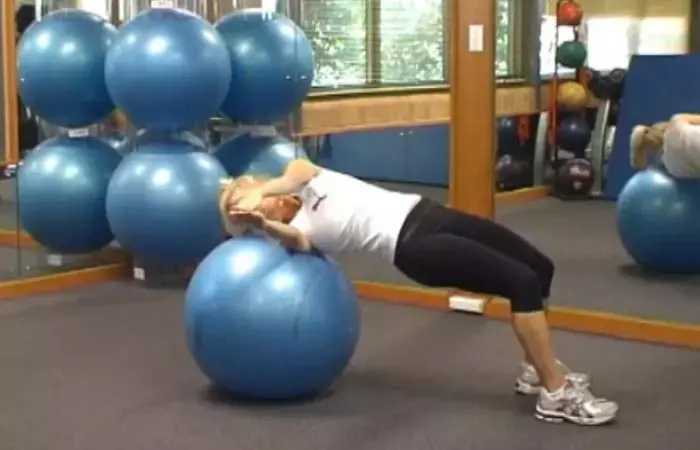
– Obliques, core, deltoids, and lats.
Steps
- To do ball twists, sit on a Swiss ball, and keep your feet flat on the ground.
- Roll down and let your shoulder blades rest on the ball. Your hips should be in line with the rest of the body.
- Extend your hands up above the chest. Clasp them together, and start rotating first to the right and then to the left. Make sure the movement happens through your upper torso. As you do so, the ball will also move and help you stabilize the movement.
- After finishing your set, walk-in and return to the seated position.
Sets And Reps
– 3 sets of 10 reps
Rest – 30 secs
12. Swiss Ball Knee Tuck
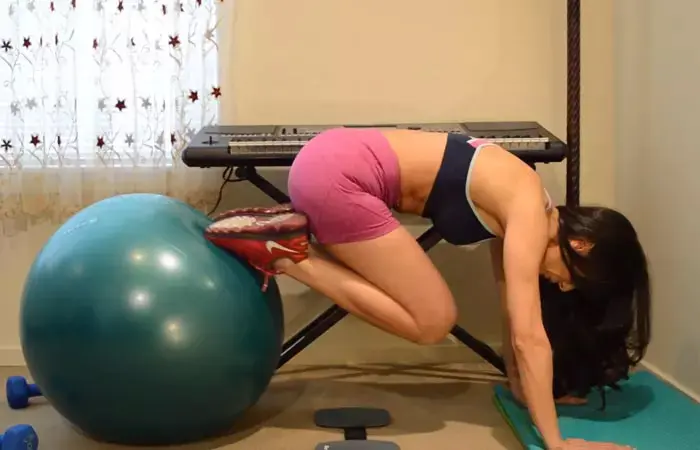
– Core, shoulders, hamstrings, and quads.
Steps
- Put a stability ball in front of you on the floor. Bend down and rest your hands on the ball. Keep your knees on the ball, hands on the floor, and walk ahead on your hands until your knees and shins are resting on the ball. You are in a decline push-up position now.
- Keep your core engaged, head down, and hands shoulder-width apart. Roll the ball and bring your knees close to your chest.
- Roll the ball back and extend your legs back to the push-up position.
Sets And Reps
– 3 sets of 10 reps
Rest – 30 secs
Tip: Increase the reps as you progress and become more comfortable with this exercise.
13. Swiss Ball Pike Crunch
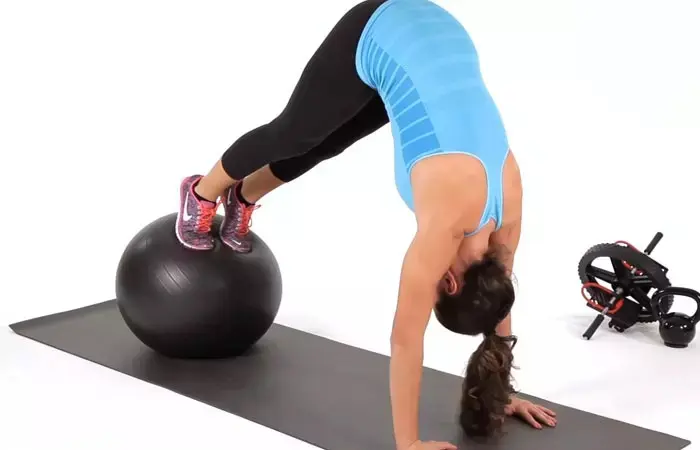
– Core, shoulders, glutes, hamstrings, and quads.
Steps
- This is an advanced move. Ask your trainer to help you if you are a beginner.
- To do ball pikes, position the Swiss ball behind you, lift your legs and place them on the ball. Support your upper body by placing your palms flat on the floor. Lift your hips in line with the rest of your body and keep your toes pointed. This is the starting ball plank position.
- Push your hips up towards the ceiling, drop your head, and look at your thighs. Hold this pose for 2 seconds.
- Push your hips down and go back to the plank position.
Sets And Reps
– 3 sets of 5 reps
Rest – 30 secs
14. Swiss Ball Crossover Crunch
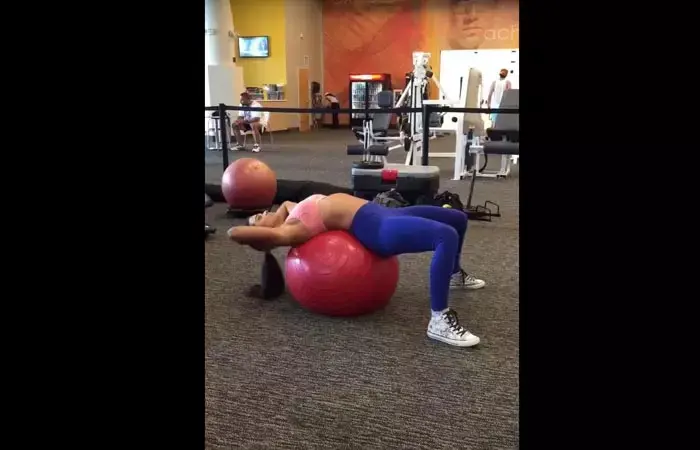
– Core, obliques, and shoulders.
Steps
- Sit on a Swiss ball. Keep your feet flat on the ground. Roll down and let your lower backrest on the ball. Support your head by placing your hands behind it.
- Fall back on the ball, keep your core engaged, pull your upper body up, and twist to your left.
- Fall back on the ball, pull your upper body up, and twist to your right.
Sets And Reps
– 3 sets of 5 reps
Rest – 30 secs
15. Swiss Ball Pelvic Tilt
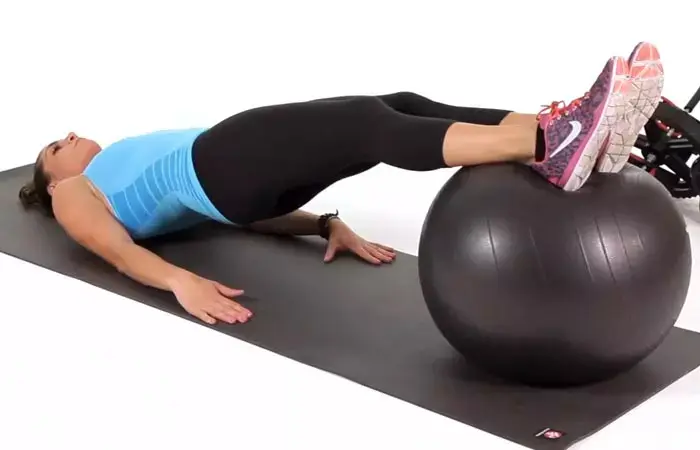
– Abs, pelvic floor muscles, and glutes.
Steps
- Sit on the floor and put the Swiss ball under your heels. Lie back down on the mat and align yourself. Keep your hands on the sides and palms facing down.
- Squeeze your glutes and pull your hips up. Go as high as you can. Hold this position for 2 seconds and then go back down.
Sets And Reps
– 3 sets of 10 reps
Rest – 30 secs
16. Swiss Ball Incline Plank
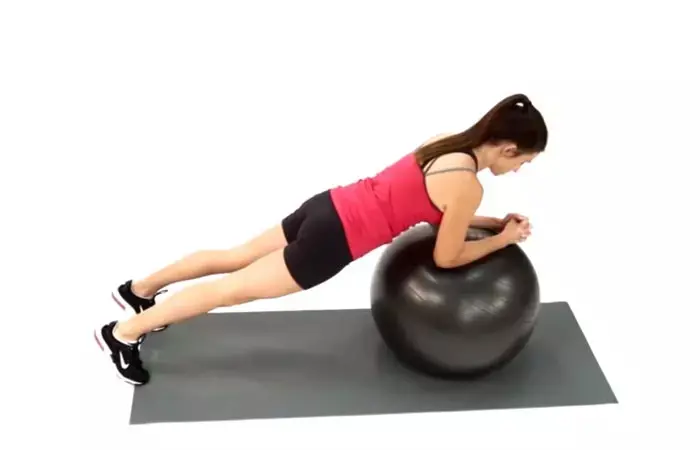
– Core
Steps
- Stand behind the Swiss ball and position your elbows on the top center of the ball and interlock your fingers.
- Extend your legs back and support your body on your toes.
- Hold this position for 30-60 seconds.
Sets And Reps
– 2 sets
Rest – 60 secs
17. Swiss Ball Decline Plank
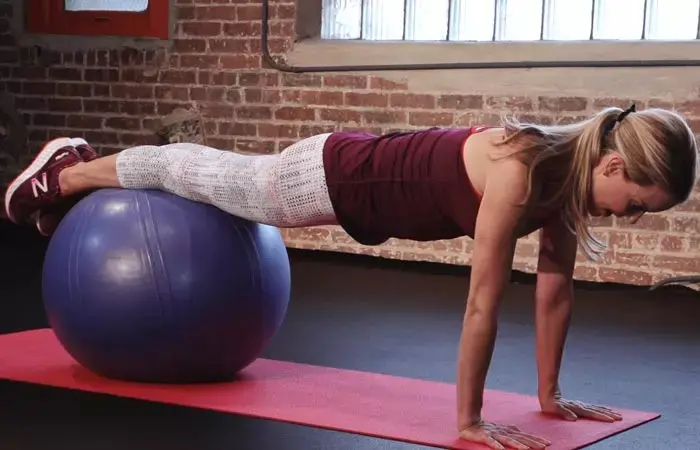
– Core
Steps
- Bend over a Swiss ball and place your palms on the floor. Walk out on your hands until your legs are straight, and your knees and shins are on the Swiss ball.
- Keep your arms straight and core engaged and hold this pose for 30-60 seconds.
- Walk back to the initial position.
Sets And Reps
– 2 sets
Rest – 60 secs
18. Swiss Ball Side Plank
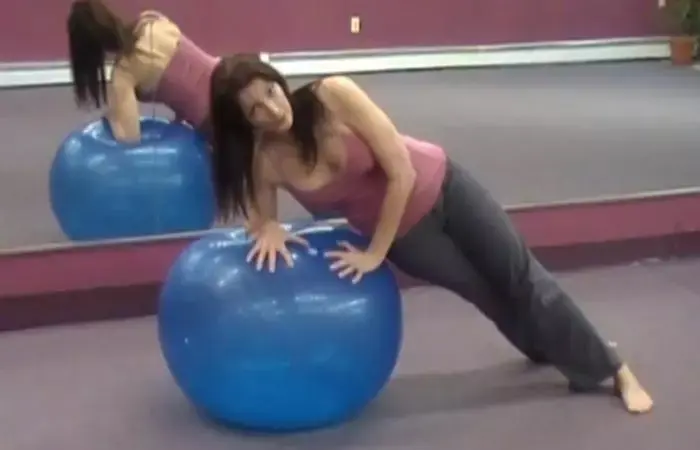
– Core and obliques.
Steps
- Kneel down and keep the Swiss ball on the right. Hold it with your right hand and stabilize it by holding it close to your pelvic region.
- Straighten your left leg. Keep your foot flat on the ground, and bend on your right to support and stabilize your body.
- Straighten the right leg, but keep it behind the left. Keep your right elbow behind the shoulders, and rest the side of your torso on the Swiss ball.
- Exhale and pull your body off the ball. Support your body on your feet and keep your hands on the ball. Keep breathing and hold this pose for 30 seconds.
- Breathe out and lower your body back to the starting position.
Sets And Reps
– 2 sets
Rest – 60 secs
19. Swiss Ball V-Pass
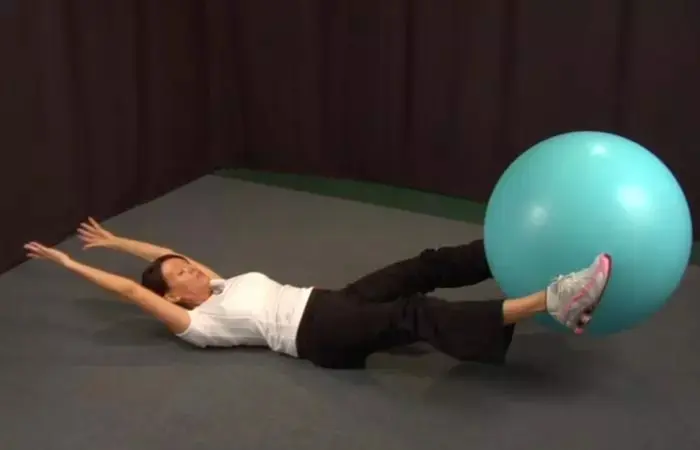
– Upper and lower abs, shoulders, glutes, quads, and hamstrings.
Steps
- Lie down on a mat and place the Swiss ball between your ankles.
- Hold the ball with the sides of your ankles.
- Keeping your legs straight, bring your legs toward your upper body. Simultaneously, curl your upper body up. Keep your hands extended and reach out for the ball.
- Pass the ball from between your ankles to your hands and lower your legs and hands, but do not let them touch the ground.
- Exhale and curl back up and pass the ball from your hands to between the sides of your feet.
Sets And Reps
– 3 sets of 5 reps
Rest – 30 secs
20. Swiss Ball Mountain Climber
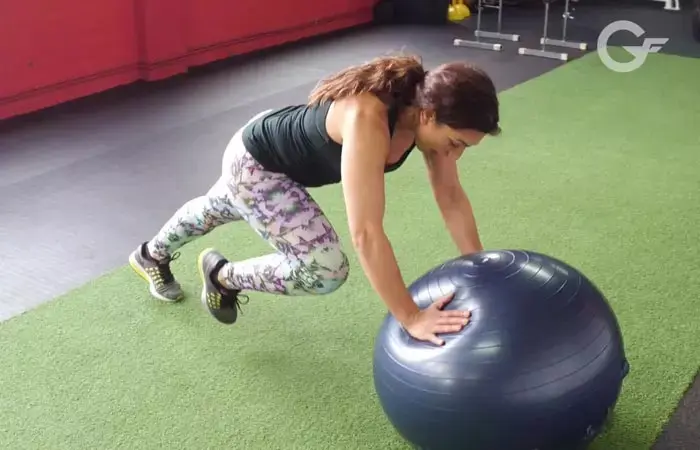
– Core, obliques, quads, and glutes.
Steps
- Stand in front of a Swiss ball. Bend down and place your palms on it. Keep your arms shoulder-width apart, extend your legs behind, and get into a plank position.
- Keeping your core engaged, inhale, and bring your right knee toward your chest and then push it back.
- Bring your left knee toward your chest and then push it back.
- Do this at medium speed.
Sets And Reps
– 3 sets of 15 reps
Rest – 30 secs
Doing these core exercises with the Swiss ball will help you strengthen and tone your abs. However, you may combine these with other core strengthening exercises to bring some variety to your routine and train your ab muscles.
You can also tone your back with the stability or Swiss ball. Let’s explore some exercises in the next section.
Swiss Ball Exercises For The Back
21. Swiss Ball Arm And Leg Lift
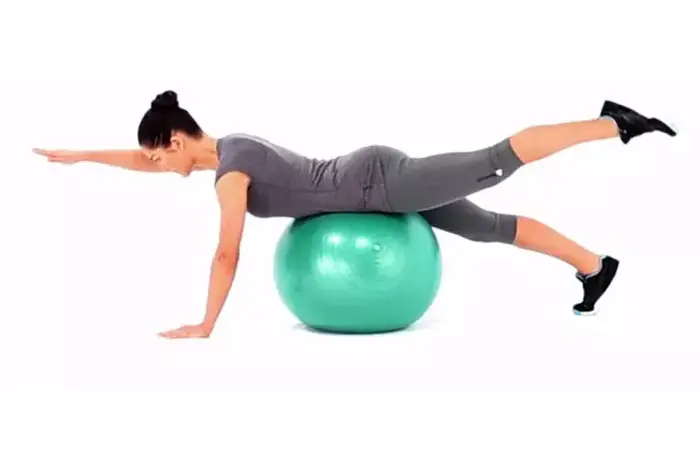
– Lats, deltoids, glutes, and hamstrings.
Steps
- Lie on your belly on a Swiss ball and support your body by keeping your arms straight and palms on the floor. Support your lower body by flexing your toes and keeping your legs shoulder-width apart.
- Raise your right arm and point it straight ahead. Keep your gaze down, toward the floor. Raise your left leg simultaneously, with the toes pointing out.
- Hold it for one second and release.
- Raise your left arm and point it straight ahead and simultaneously raise your right leg, with the toes pointing out.
Sets And Reps
– 3 sets of 10 reps
Rest – 30 secs
22. Swiss Ball Back Extension
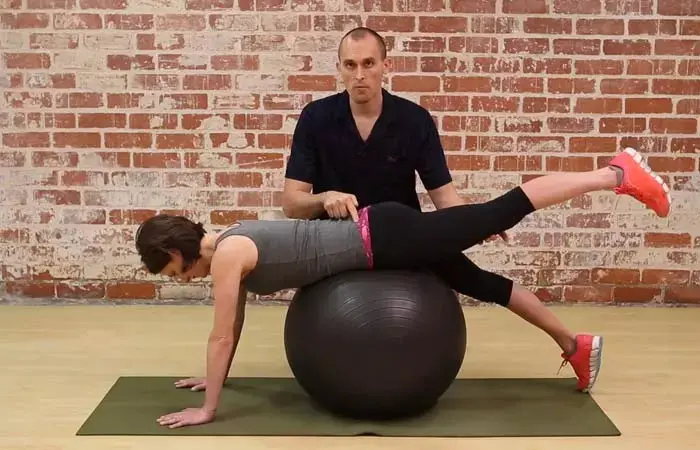
– Lats, deltoids, rhomboids, and glutes.
Steps
- Kneel in front of a Swiss ball. Roll over it and bring your pelvis over the center of the ball. Keep your hands straight down and palms flat on the floor. Support your lower body on your toes.
- Keeping your lower back still, squeeze your glutes, and lift your right leg. Hold it for a second and lower your leg.
- Keeping your lower back still, squeeze your glutes, and lift your left leg. Hold it for a second and lower your leg.
Sets And Reps
– 3 sets of 10 reps
Rest – 45 secs
23. Swiss Ball Superman
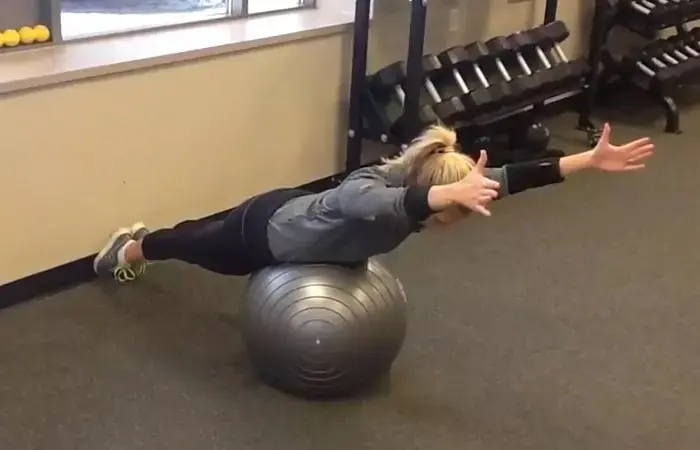
– Middle back, shoulders, glutes, and hamstrings.
Steps
- Kneel in front of a wall and behind a Swiss ball.
- Roll over on the ball until your hips are on the top center of the ball and feet against the wall and a little wider than shoulder-width apart.
- Extend your right arm and then your left, and lift your upper body and go back down.
Sets And Reps
– 3 sets of 10 reps
Rest – 45 secs
24. Swiss Ball Prone Cobra
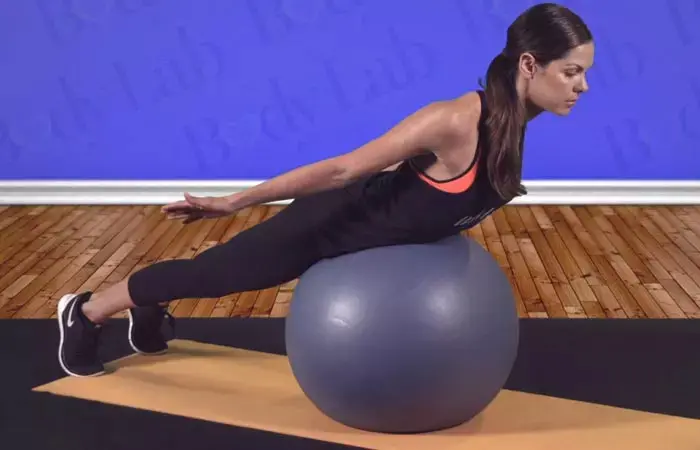
– Deltoids, rhomboids, and lats.
Steps
- Lie on the Swiss ball. Your rib cage area should be at the top center of the ball.
- Move your feet a little wider than shoulder-width apart. Keep your toes flexed, and hands extended and a little more than shoulder-width apart.
- Move your arms back, pull your upper body up, and look down. Hold this pose for 10 seconds.
- Drop down and bring your arms back to the initial position.
Sets And Reps
– 3 sets of 10 reps
Rest – 30 secs
Another exercise you can try is the ball lunges. You perform lunges but with the Swiss ball. These were the exercises for the back with a Swiss ball or stability ball. Let’s move on to Swiss ball exercises for the lower body.
Lower Body Swiss Ball Exercises
25. Swiss Ball Hamstring Curl
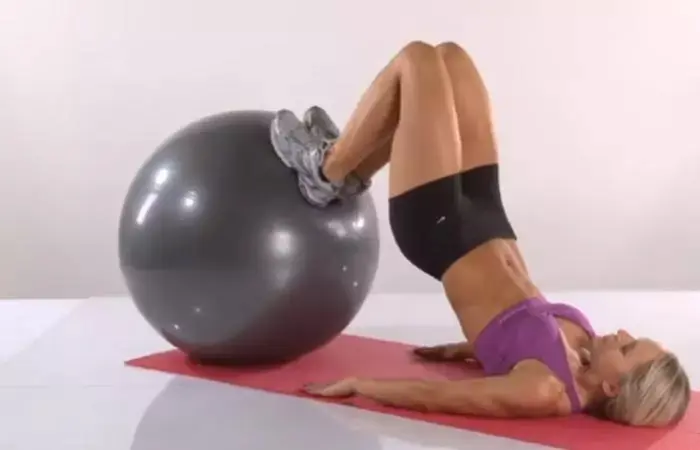
– Hamstrings and gastrocnemius muscles.
Steps
- Lie down on your back on a mat. Lift your legs and tuck your lower leg so that the femur and shin are at right angles with each other.
- Place the Swiss ball right below your heels. Keep your hands on your sides and palms facing down.
- Lift your buttocks, roll the ball, and straighten the legs.
- Bring the legs back to the initial position and roll the ball back in.
- After completing the reps, lower your buttocks.
Sets And Reps
– 3 sets of 10 reps
Rest – 30 secs
26. Swiss Ball Wall Squat
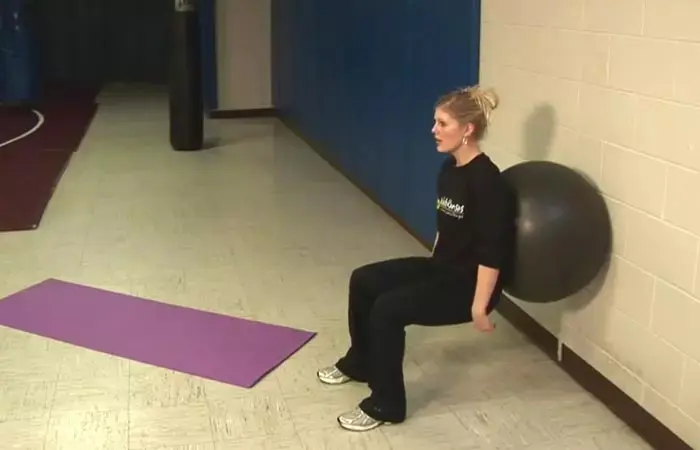
– Glutes, hamstring, and quads.
Steps
- Place the ball between the wall and your back. Keep your feet shoulder-width apart.
- Squat down slowly for ball squats and then get back up.
Sets And Reps
– 3 sets of 10 reps
Rest – 60 secs
27. Swiss Ball Single-Leg Bridge
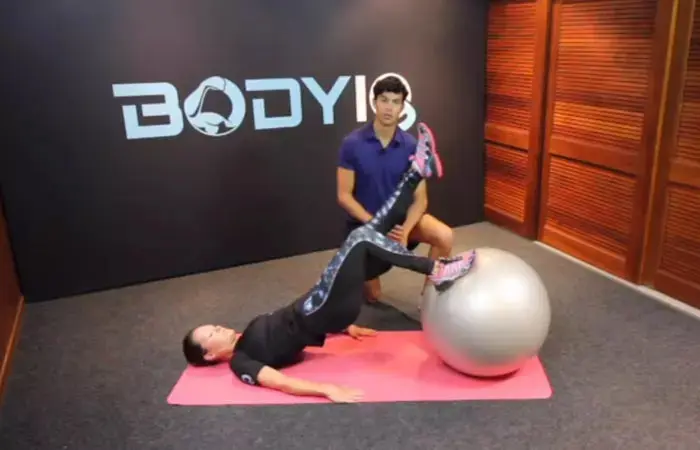
– Glutes and core.
Steps
- To do ball bridges, lie down on your back and put your feet up on a Swiss ball. Your shins should be at right angles with your thighs, and palms flat on the floor.
- Lift your hips so that your torso is in line with the thighs.
- Raise your left foot from the Swiss ball and hold this pose for 5 seconds.
- Lower your leg, put your foot back on the ball, and lower your hips.
- Bridge again and raise your right leg. Hold this pose for 5 seconds and go back to the starting position.
Sets And Reps
– 3 sets of 5 reps
Rest – 30 secs
28. Swiss Ball Hip Extension
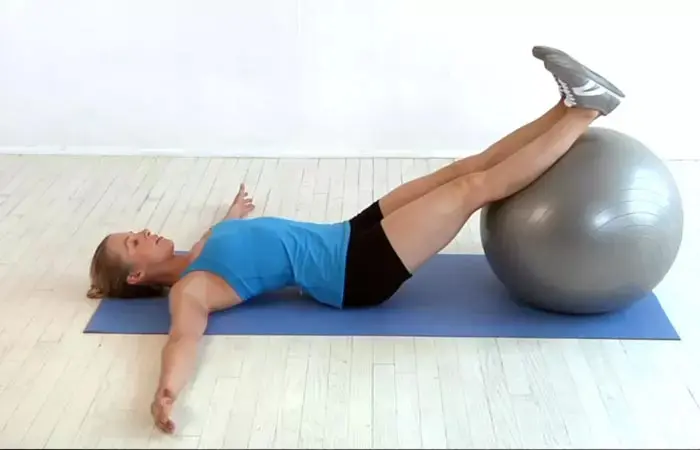
– Calves, hamstrings, glutes, and lower back.
Steps
- Place the ball on the edge of the mat. Lie down on the floor and put your legs up on the ball. Your legs should form a 60-degree angle with the floor. Keep your arms in a ‘T’ formation and palms facing upward. Your calves and heels should rest on the ball. Ensure your toes are pointing to the ceiling, and abs are engaged.
- Inhale and lift your hips. Exhale and lower your hips back to the floor.
Sets And Reps
– 3 sets of 10 reps
Rest – 45 secs
29. Swiss Ball Hip Raise
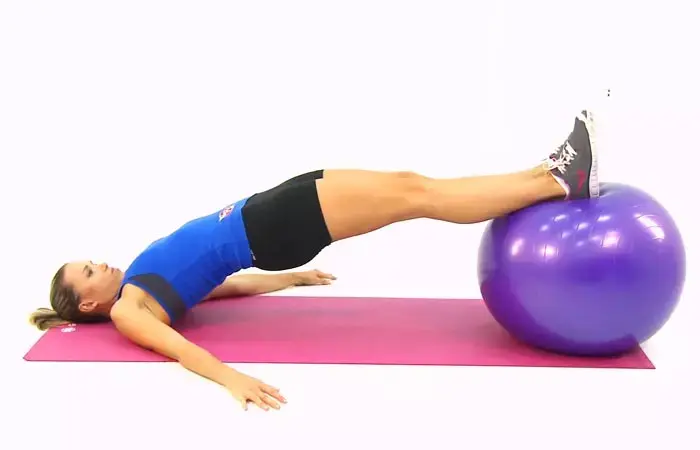
– Glutes, hamstrings, lower back, and core.
Steps
- Place the ball at the edge of the mat. Lie down on the floor, extend your legs, and put them up on the ball. Keep your hands on the side and palms facing down.
- Inhale and push your hips up. Keep your legs straight. Hold this position for a second.
- Exhale and return to the starting position.
Sets And Reps
– 3 sets of 15 reps
Rest – 60 secs
30. Swiss Ball Glute Kickback
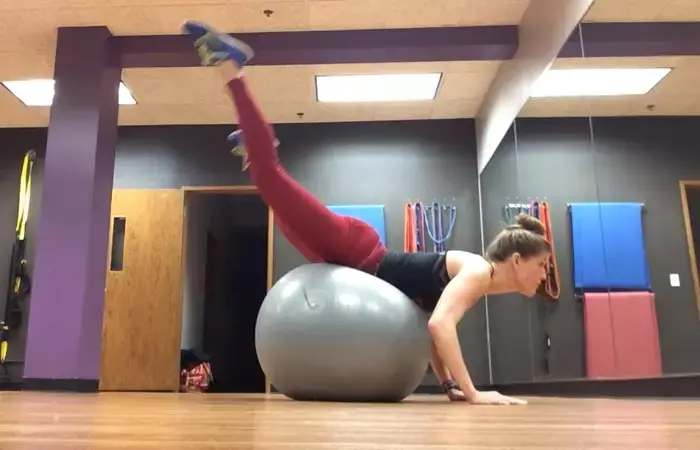
– Glutes, quads, hamstrings, adductors, and lower abs.
Steps
- Lay your body on the Swiss ball. Your belly and pelvis should be at the top center of the ball. Support your body on your palms and toes. Keep your legs a little wider than shoulder-width apart.
- Supporting your body on your palms, lift both your legs and kick back toward the ceiling.
- Lower your legs back to the starting position.
Sets And Reps
– 3 sets of 10 reps
Rest – 45 secs
Note: Focus on practicing the basic form of these exercises if you are a beginner. Once you have a solid form, move on to increase the intensity and repetitions for intermediate and advanced levels.
Before you perform these stability ball exercises, scroll down to learn about a few things you need to keep in mind to ensure safety.
Safety Tips
Here are some safety tips for stability ball exercises that you should follow to prevent injuries:
- Place the ball on a non-slip, flat surface like a yoga mat to prevent it from slipping or rolling too much.
- Keep your core engaged and your back straight to avoid unnecessary strain.
- If you are just starting out, do the exercises near a wall or sturdy piece of furniture in case you need extra support. You may also perform them under the guidance of an expert.
- Inspect the stability ball regularly for signs of wear, tear, or punctures to avoid accidents.
Before you start using or buy one, here’s how to choose a Swiss ball for exercising.
Which Swiss Ball Should You Choose?
Swiss balls come in different sizes. Depending on your height, choose the perfect Swiss ball.
If you are 4’11”- 5’4” tall, you should opt for the 55 cm diameter Swiss ball. If you are 5’4” – 5’7” tall, go for the 65 cm diameter ball, and if you are 5’1” – 6’7” tall, use the 75 cm diameter ball.
Sit on the ball and check if your thighs and shins are at right angles with each other and your feet flat on the floor. Now, you are good to go and start exercising.
 Quick Tip
Quick TipInfographic: Benefits Of Using A Stability Ball
A Swiss ball or stability ball not only helps keep your spine and joints flexible but also adds fun and variety to your total body workout routine. You can also amp up your level of workout with advanced levels of exercises.
Have a look at the infographic below to know more about the intrinsic benefits of a stability ball.
Some thing wrong with infographic shortcode. please verify shortcode syntax
Improved flexibility, stability, and balance are many of the benefits of swiss ball or fitness ball exercises. You can use a swiss ball of varying size as per your choice of exercise and the muscle workout you aim for. The softness and instability of the balls help improve the strength of your muscles by involving your body weight and resistance. Along with toning your core muscles, these help reduce pain and aches adding to your strength, endurance, and agility. After you get comfortable with these exercises you can move on to harder workouts like Bosu ball exercises and resistance band ball exercises.
Frequently Asked Questions
How often should I incorporate stability ball exercises into my routine?
You may incorporate stability ball exercises in your routine 2 to 3 times a week, especially if you are a beginner. As you progress, you may adjust the frequency based on your fitness level and goals. Just ensure to have rest days in between for muscle recovery.
Are exercise balls good for abs?
Yes, exercise balls are good for abs, but you need to learn the right technique from a trained professional irrespective of whether you follow Swiss ball or medicine ball exercises.
Does sitting on an exercise ball strengthen your back?
Swiss ball exercises are great for strengthening the back. However, if you have a back injury, you must do the exercises recommended by your doctor under the supervision of your physical therapist.
How often should I do stability ball exercises to see results?
For the best results, incorporate stability ball exercises into your daily workout routine.
Are there any precautions or contraindications for stability ball exercises?
Avoid doing stability ball exercises if you have any neuromusculoskeletal disorder. Consult a healthcare professional before attempting any ball exercises, and work under the supervision of a trained specialist to reduce the risk of injury and mistakes for fruitful session.
What are some of the common mistakes to avoid when performing stability ball exercises?
Choosing the wrong ball size, not inflating the ball properly, and poor technique are common mistakes to avoid while performing stability ball exercises.
References
Articles on StyleCraze are backed by verified information from peer-reviewed and academic research papers, reputed organizations, research institutions, and medical associations to ensure accuracy and relevance. Read our editorial policy to learn more.
- The Effect of Swiss Ball Stabilization Exercise on Pain and Bone Mineral Density of Patients with Chronic Low Back Pain, Journal of Physical Therapy Science, US National Library of Medicine, National Institutes of Health.
https://www.ncbi.nlm.nih.gov/pmc/articles/PMC3820231/ - The effects of trunk stabilization exercise using a Swiss ball in the absence of visual stimulus on balance in the elderly, Journal of Physical Therapy Science, US National Library of Medicine, National Institutes of Health.
https://www.ncbi.nlm.nih.gov/pmc/articles/PMC4968524/ - Effects of stabilization exercises with a Swiss ball on neck-shoulder pain and mobility of adults with prolonged exposure to VDTs, Journal of Physical Therapy Science, US National Library of Medicine, National Institutes of Health.
https://www.ncbi.nlm.nih.gov/pmc/articles/PMC4434028/
Read full bio of Dr. Sudhansu Singh
Read full bio of Ravi Teja Tadimalla
Read full bio of Payal Karnik







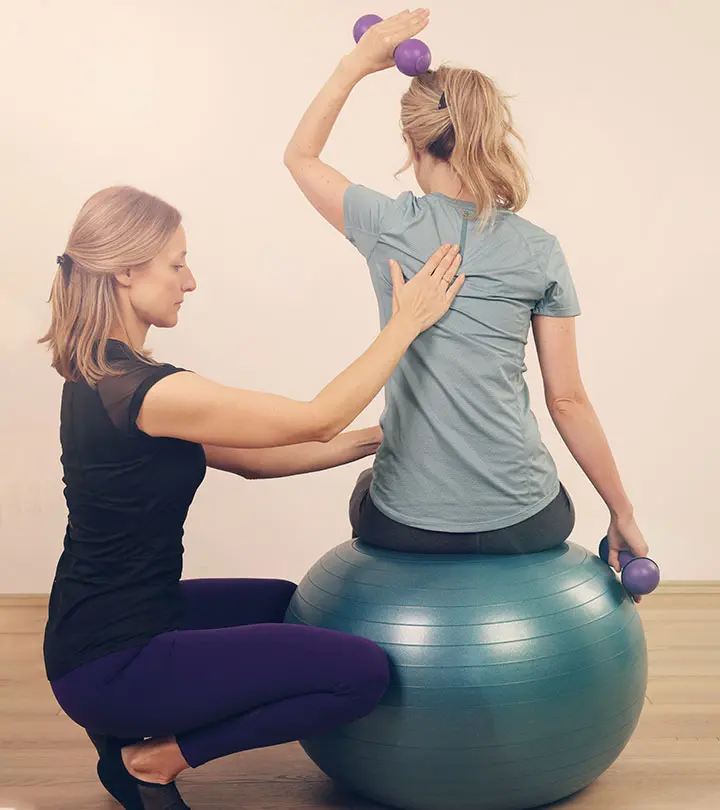
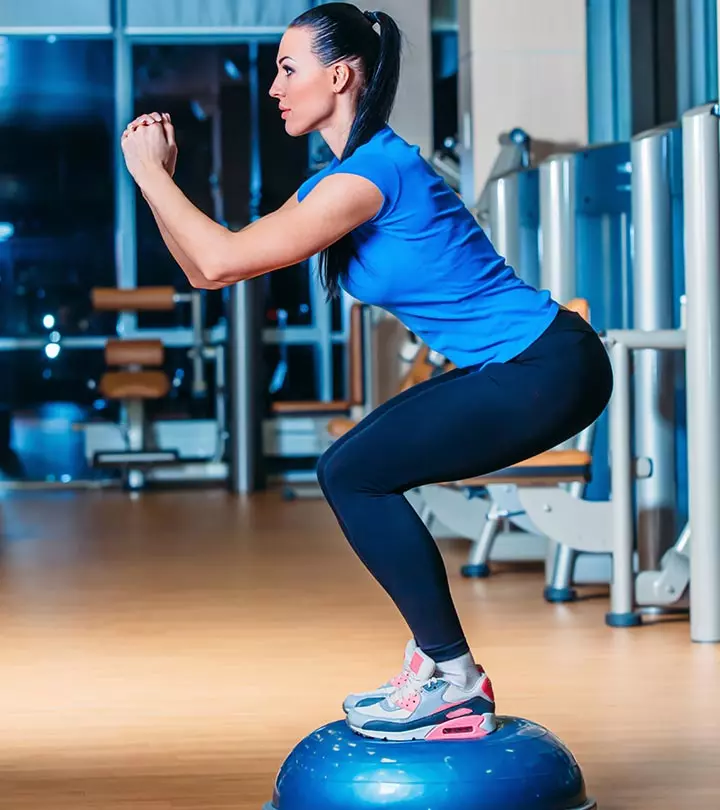
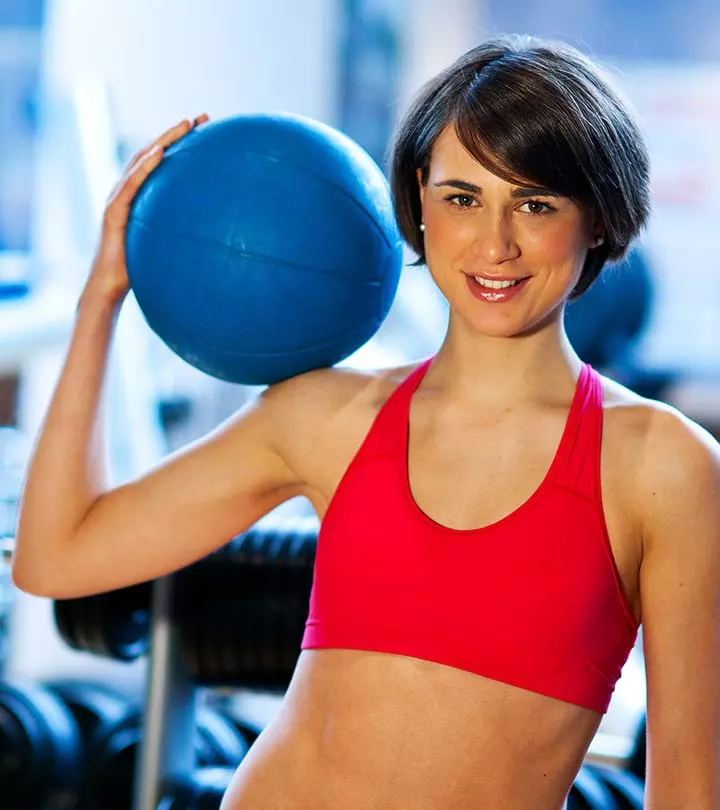
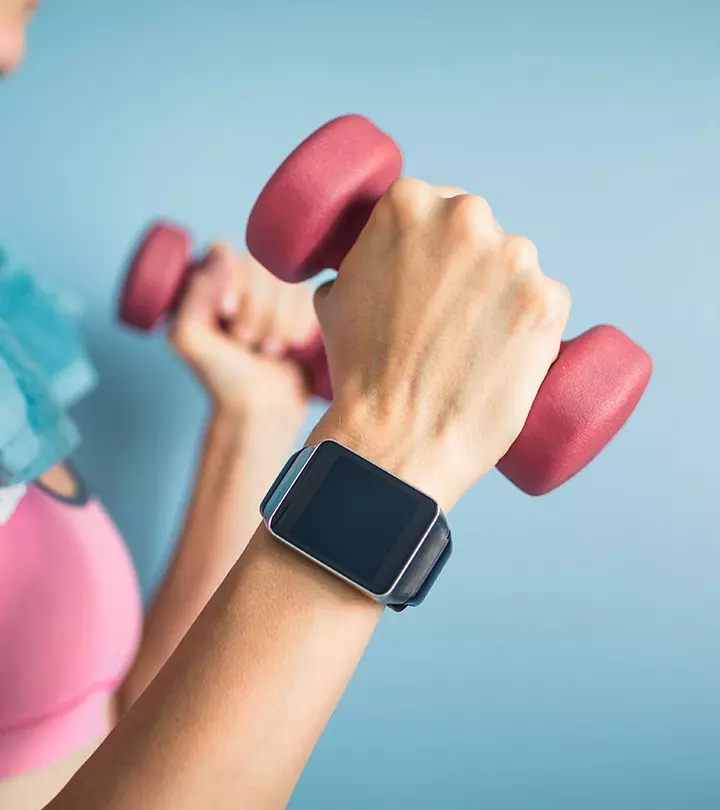

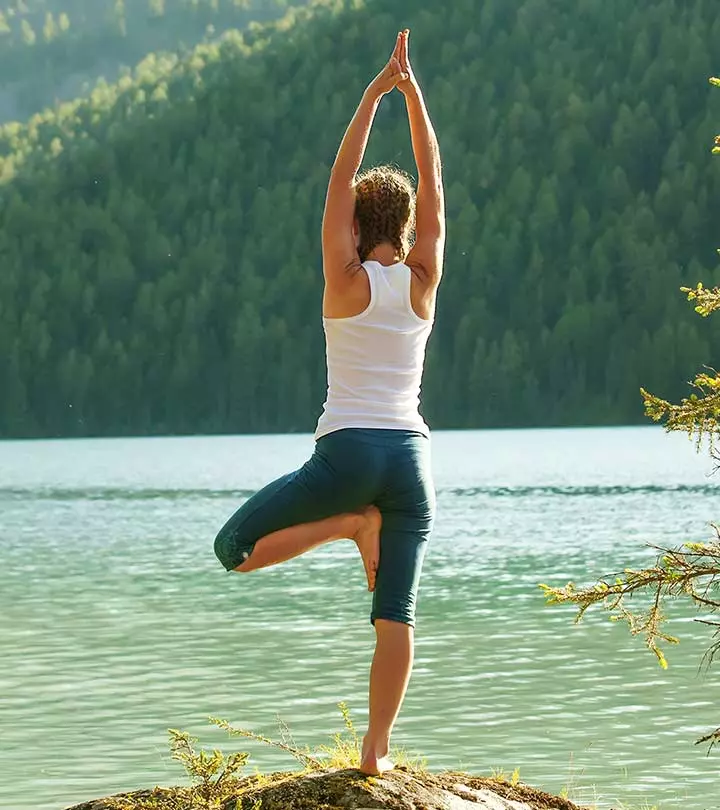
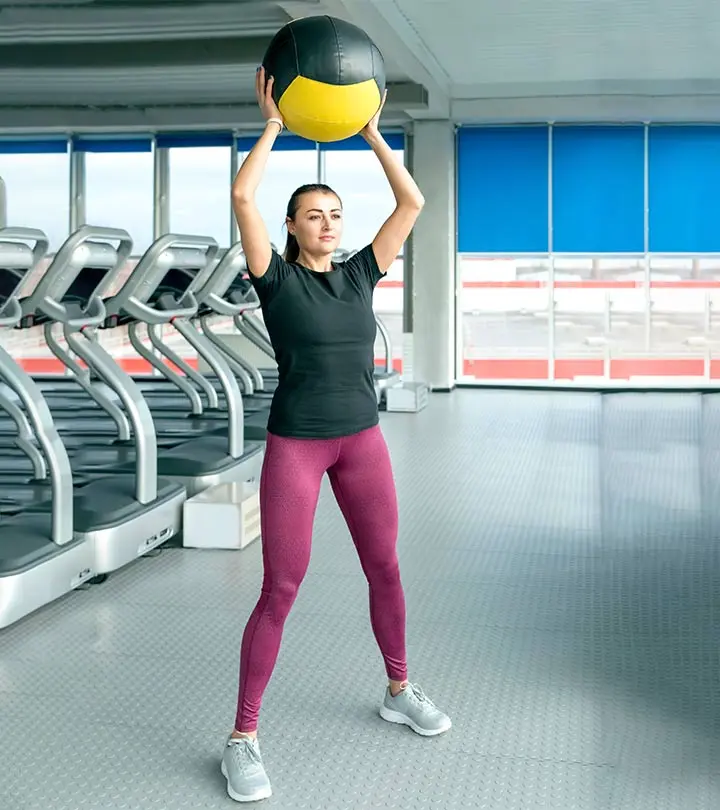



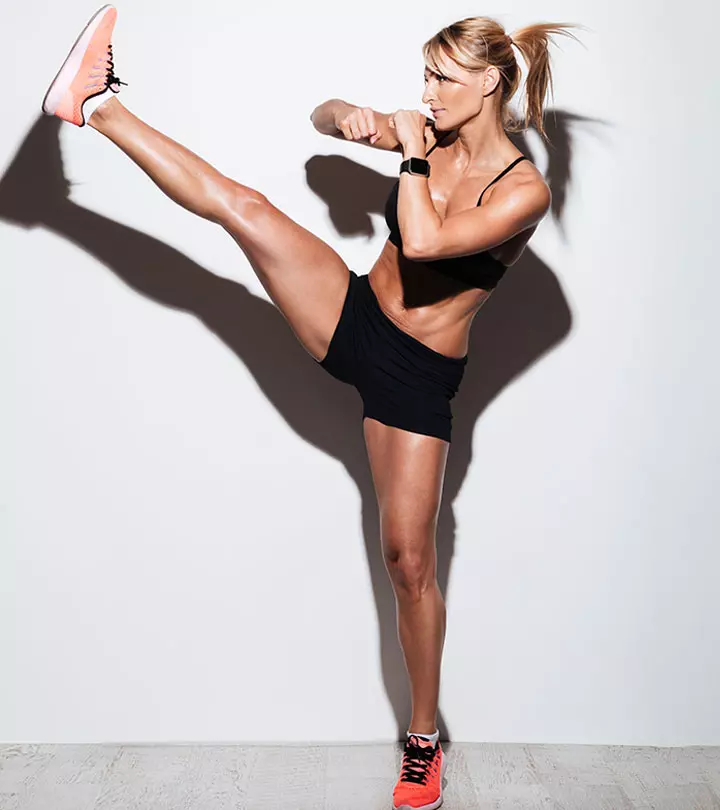



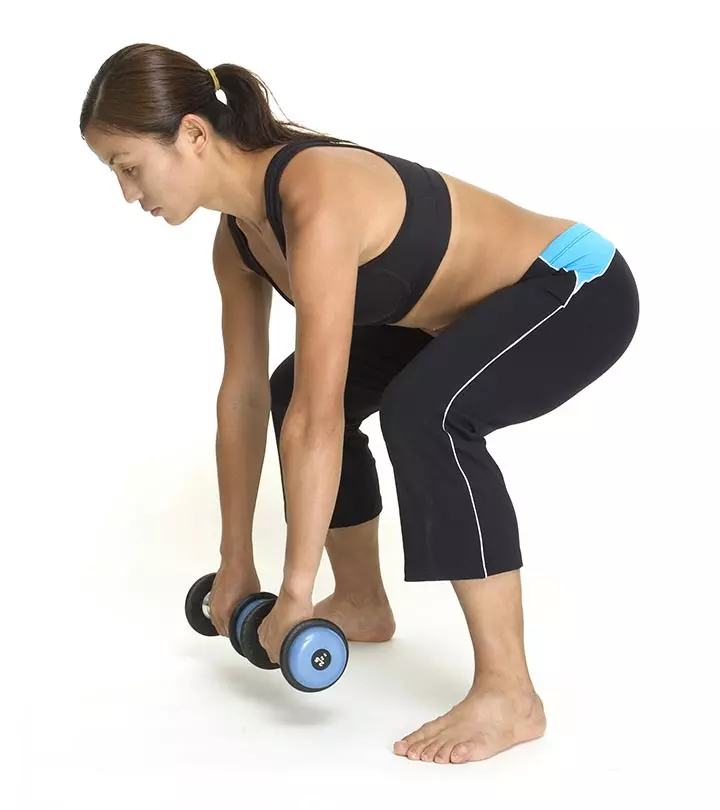

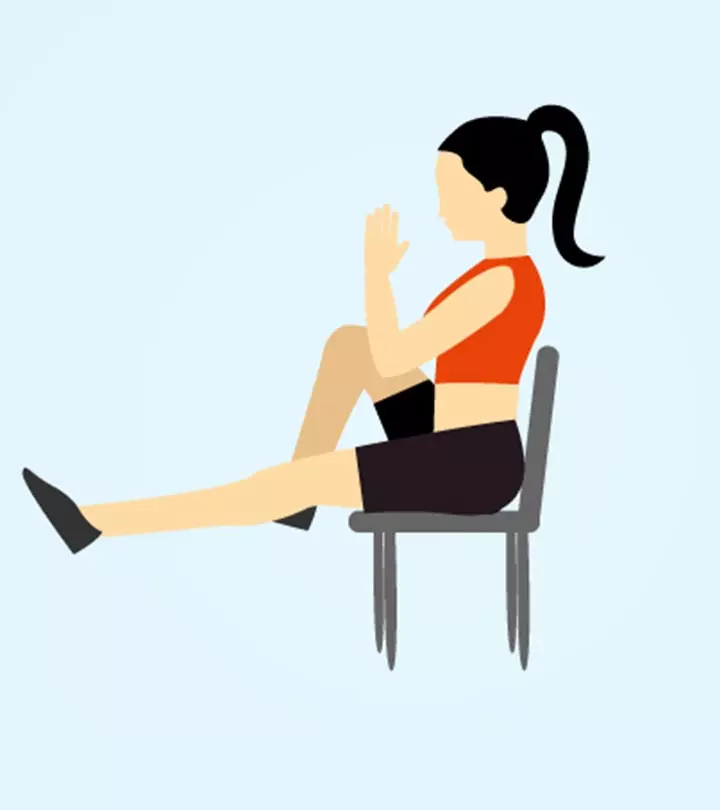
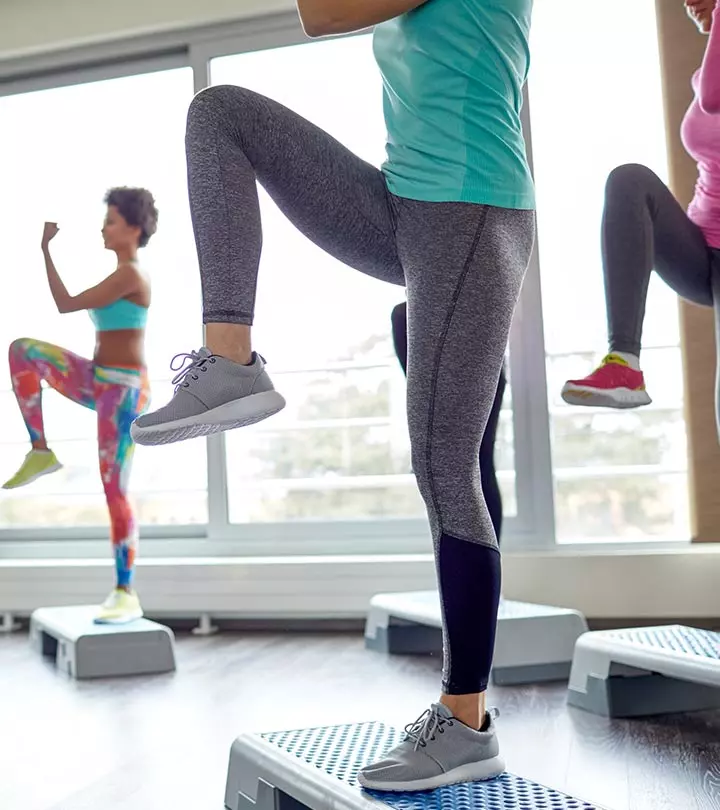
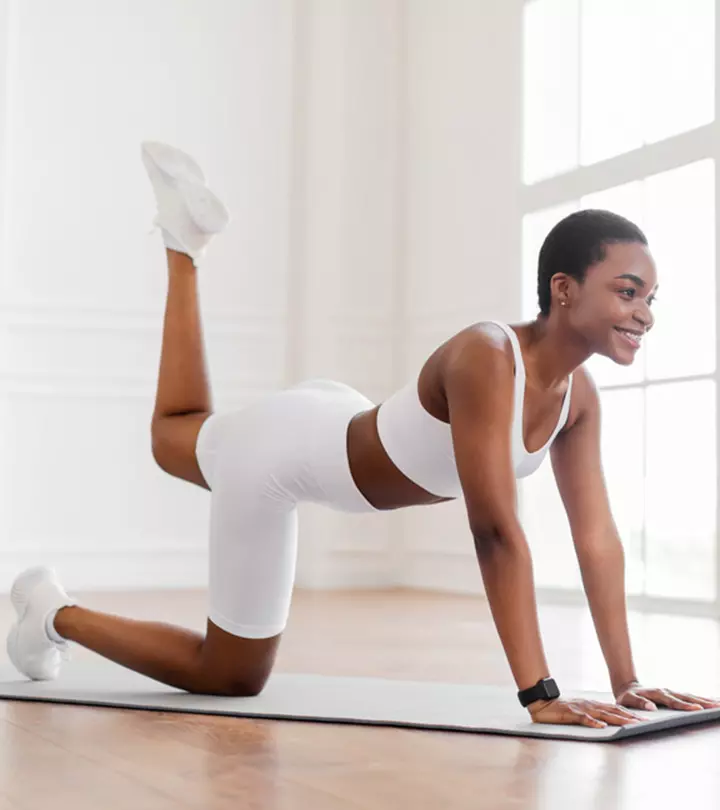

Community Experiences
Join the conversation and become a part of our empowering community! Share your stories, experiences, and insights to connect with other beauty, lifestyle, and health enthusiasts.